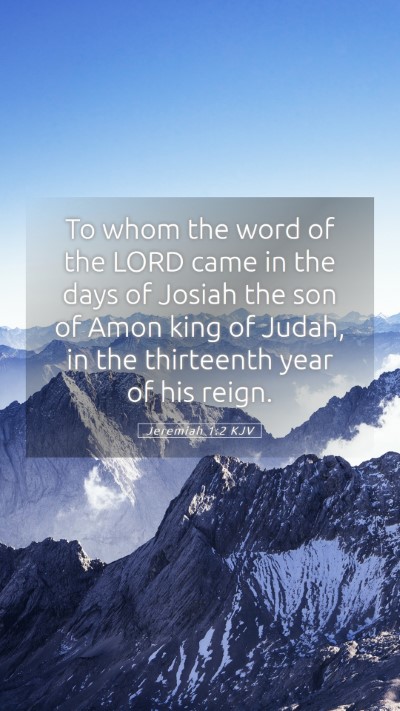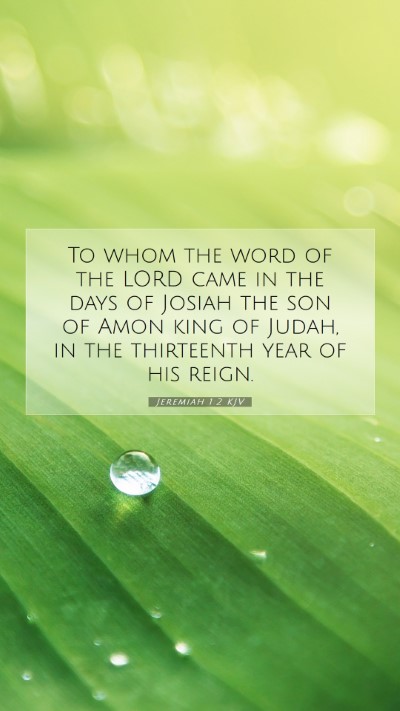Understanding Jeremiah 1:2
Jeremiah 1:2 states, "To whom the word of the LORD came in the days of Josiah the son of Amon, king of Judah, in the thirteenth year of his reign." This verse marks the inception of the prophetic ministry of Jeremiah, providing significant context for interpreting his messages throughout the book. Below is a synthesis of insights from various public domain commentaries, delving into the deeper meanings and implications of this scripture.
Contextual Overview
- Historical Background: Jeremiah's ministry commenced during a tumultuous time for Judah, positioned in a period of impending national calamity. The mention of King Josiah's reign signifies a time when reform attempts were made to restore proper worship of Yahweh among the people, which ultimately sets the stage for Jeremiah's prophetic warnings.
- The Prophetic Call: Each prophetic call in the Bible, including Jeremiah’s, is significant as it establishes the authority and divine mandate behind the prophet's words. It indicates that Jeremiah was chosen and empowered by God to deliver His messages.
Insights from Commentaries
Matthew Henry's Commentary
Henry emphasizes the importance of recognizing that prophets were chosen by God, infused with authority to speak on God's behalf. This verse indicates that Jeremiah's ministry is a fulfillment of God's sovereign choice, suggesting that his messages are not merely human ideas but divine revelations meant to guide and admonish the people of Judah.
Albert Barnes' Notes
Barnes highlights the significance of the timing in verse 2, suggesting that understanding the historical context of Josiah's reign provides insight into the nature of the messages delivered by Jeremiah. During Josiah's reforms, there was hope for the people, thus making the prophetic warnings even more poignant as they were set against a backdrop of potential revival and spiritual renewal.
Adam Clarke's Commentary
Clarke elaborates on the sociopolitical conditions under Josiah, noting that his reign involved significant changes in the national worship practices. The appearance of God's word during this period illustrates a divine reminder of covenant loyalty and calls the people to responsibility in response to their circumstances.
Thematic Implications
- The Role of Prophets: This verse encapsulates the thematic essence of prophetic ministry in the Old Testament. It underscores the notion that God communicates with His people through chosen vessels.
- Divine Communication: The phrase 'the word of the LORD' signifies God’s active engagement with humanity, reminding readers that divine wisdom is available and pertinent to daily life.
- Hope and Judgment: The tensions between hope during reforms under Josiah and the looming judgment foretold by Jeremiah set a dichotomy that is prevalent throughout the prophetic literature.
Application in Bible Study
For those engaged in Bible study groups or seeking to deepen their Bible study insights, this verse invites reflection on the clarity and authority with which God's messages are conveyed. Learning how to interpret Bible verses requires understanding the historical context, recognizing the role of divine agency, and discerning the significance of prophetic calls in relation to contemporary faith experiences.
Cross References
- Isaiah 6:1-8 - The calling of Isaiah as a prophet and his response to God’s call.
- Ezekiel 2:1-5 - God’s commissioning of Ezekiel, paralleling the establishment of prophetic authority.
- 2 Kings 22:1-2 - Josiah’s reforms and the context in which Jeremiah prophesies.
- Jeremiah 7:1-3 - Further elaboration on Jeremiah’s call to Judah to amend their ways.
Conclusion
In conclusion, Jeremiah 1:2 presents profound layers of meaning that enrich our understanding of Scripture. It illustrates God’s persistent communication with His people, the essential nature of prophetic ministry, and the historical backdrop that shapes our interpretation. This understanding is vital for anyone seeking Bible verse explanations and deeper insights into the active engagement between God and His people throughout human history.


